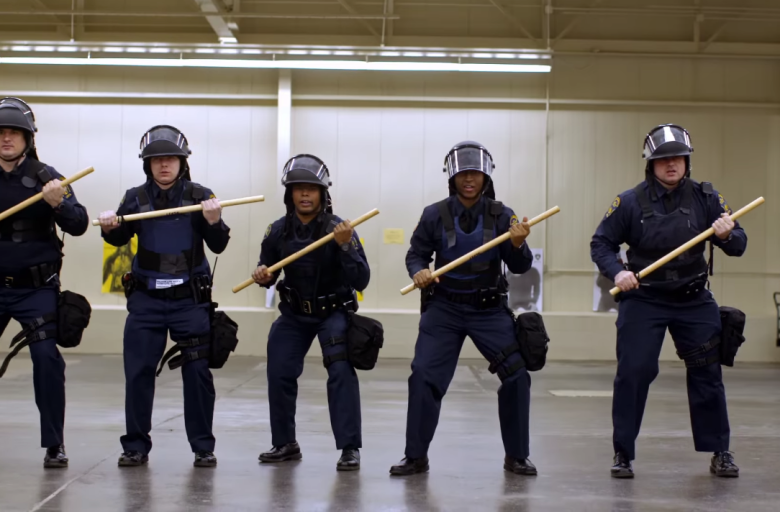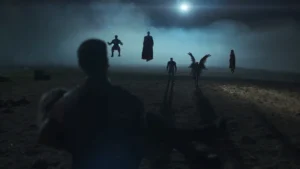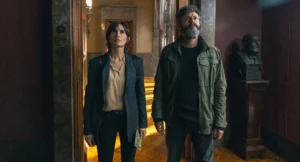Docuseries Flint Town offers a tantalizing glance into one of the most underfunded yet hardest-working police forces in America. The town of Flint is riddled with troubles that stretch much further than violence and crime. Flint Town explores themes of race, religion, corruption, and discrimination from all sides of the story. It was co-directed by Zackary Canepari, Jessica Dimmock, and Drea Cooper and starred Flint’s police force, citizens, news anchors, and politicians.

(Netflix)
Flint was once a prosperous town, a home for the American dreamers, a safe place to settle, and a place where you could once leave your door screens unlocked. Flint Town is set during the year 2016. Flint is under a state of emergency after poisonous lead levels are discovered in the water supply.
This is only the beginning of the list of calamities that fall upon the intractable town of Flint. Flint has some of the highest rates of violence and also, shamefully, the smallest police force per resident in all of the US states. These clearly unbalanced facts lead to altercations between the citizens and it’s policing body.
Flint Town, honestly, took my breath away on more than one occasion as I leaned forward on the edge of my seat, holding my breath in anticipation. On the surface alone, Flint Town is possibly the most polished documentary series I’ve seen in a long time. I must praise the co-directors for taking advantage of the available environment, to create an urban aesthetic, bringing life to the immense character of the town itself.
Shots are constantly manipulated and colour corrected in such a fashion that the lighting naturally present in a scene could easily be mistaken as a high-end studio set in a Hollywood film. Combined with aesthetically engaging montages, inter-cut with scenes of despair, hope and agonising details of homicide and crime, the cinematography and final look is remarkable, to say the least.
The subjects in the documentary series must be praised for their commendable honesty and frankness. It’s hard not to feel nervous about some of the topics that subjects choose to share, or the opinions they dare expose. Flint Town’s people often speak attitudes that some viewers will find difficult to swallow. Thoughts on race, politics and philosophy that exhibit the most controversial views, to the relationship between the citizens of Flint and their distrust of the police department.
This includes the disquieting first-hand explanation of how one white cop fatally shoots a black man and the controversy that soon followed. I have no doubt this documentary will open many essential lines of communication, giving viewers the context and material needed to have meaningful and possibly healing debates.
From the very first episode of the docuseries, the audience is overtly presented with footage of the scenes directly following the homicide of a teenage boy. In the town, there is no subtlety or privacy for the victim, only raw emotion and the brutal realities of life in Flint. What was once considered an atrocity in the form of homicides and crimes are now so frequent it has become the norm.
Not a matter of if a resident of Flint will be subject to crime, but rather a question of when. Flint Town does not beat around the bush; the audience sees exactly what the police do. It’s an observational documentary at its core, bringing forth a quintessentially objective approach to documentary filmmaking.
While watching Flint Town, I found myself being inconsistent in my thoughts and constantly rearranging my opinions on the issues raised. The documentary series often switches perspectives from those of the police force to the citizens of Flint and, in doing so, offers an intriguing contrast that helps encourage you to challenge your own bias. This is a superb example of how great attention to editing and even more impressive pacing can make for an eye-opening experience.
Flint Town, in all of its glory, tells the critical story of how over 10 years, the funding for the police department has wilted to the very bare minimum. Exploring the difficulties placed upon the shoulders of the police staff as their numbers dwindle from 300 officers to only 98, to cover a population of over 100,000 citizens.
The lack of funding is no more evident than when the police department is gifted a dog to join their team. The addition of a dog, taken for granted in other states that have multiple dog forces, actually gives a sign of hope to Flint. Further demonstrating the economic climate, the dog is also named after it’s sponsor, as an agreement that police would not have to spend any budget on the dog.
With all things being said, it’s really not all doom and gloom. Flint Town genuinely gives me faith that a more opportunistic future is coming for the residents of Flint. The Netflix series delves into the hopes and dreams of its police force, with welcomed sights of happiness and progress in the wake of disruption.
This is due to the overwhelmingly heartwarming following of the newly introduced police volunteer reserve; a group of citizens dedicating their free time to helping the residents of Flint. Flint Town really does great justice to honor those who are bridging the gap between the police and the citizens, forming a community rather than a “us and them” situation.
Overall, Flint Town blew me away. The cinematography and narrative structure together make for exceptional documentary filmmaking. It offers a much larger look into one of the most violent and poverty-stricken towns in all of the US. Essential viewing that challenges not just Flint, but also much more prevalent current issues of police violence, citizen distrust and the Black Lives Matter movement. Relevant and important, Flint Town is a must watch. I certainly feel that it is going to be far-reaching and go down as an influential piece of work.




